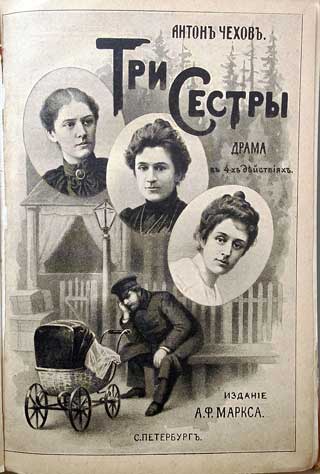Play (1901)
by Anton Chekhov
in a new version by Tracy Letts
Based on dramaturgical translations by Charlotte Hobson and Dassia Posner
Directed by Danielle Fauteux Jacques
Apollinaire Theatre Company
Chelsea Theatre Works, Chelsea, MA
December 22, 2017 – January 21, 2018
With Becca A. Lewis (Olga), Deniz Khateri (Masha), Siobhan Carroll (Irina), Michael John Ciszewski (Tusenbach), Paul Benford Bruce (Chebutykin), Jon Vellante (Solyony), Barbara Bourgeois (Anfisa), Arthur Waldstein (Ferapont), Juan Carlos Pinedo (Vershinin), Evan Turissini (Andrey), Brooks Reeves (Kulygin), Olivia Dumaine (Natasha), Demetrius Fuller (Fedotik), Robrt Orzalli (Rode), Zaida Ramos IMiad), Vijaya Sundaram (Travelin Musician), Slava Tchoul (Traveling Musician), Jamie Merkie (Traveling Musician)

Siobhan Carroll as Irina
Deniz Khateri as Masha
Becca A. Lewis as Olga
in “Three Sisters”
Photo: Courtesy of Apollinaire Theatre Company
The three sisters, Olga (Becca A. Lewis), Masha (Deniz Khateri) and Irina (Siobhan Carroll), live with their brother, Andrey (Evan Turissini), in a provincial town where the biggest excitement is the residence of a military garrison. Olga is an old maid, Masha is married to Kulygin (Brooks Reeves), a spiffy and somewhat mechanically optimistic schoolteacher with whom she is no longer in love. Irina is pursued by young Baron Tusenbach (Michael John Ciszewski), a devoted suitor whom she does not love but whom she finds hard to fend off. In rivalry for Irina’s affections is Solyony (Jon Vellante) who badgers and taunts Tusenbach. Andrey is paired with Natasha (Olivia Dumaine), who looks suitable at the outset and turns into a monster. Meanwhile, Masha finds solace and inspiration in the affections of the garrison’s commander, Vershinin (Juan Carlos Pinedo).
Nobody is terribly happy in this play, except perhaps Kulygin who seems to have a teflon sensibility and is able to look the other way while his wife, Masha, recoils from him and leans towards Vershinin. Even Kulygin, in a weak moment, exchanges expressions of affection for poor Olga who is now too old for any real passionate engagement. Irina does her best to hold the course and in the clutch opts for duty over passion but even then cannot seem to find a satisfying solution.
This inventive and interesting production makes use of three different rooms at the Chelsea Theatre Works and moves the audience around from one to another to experience each succeeding act of the play. The result is a fabulously intimate and constantly changing context in which one feels less that one is watching a play than living within it. It’s got something of the same flair as the American Repertory Theatre’s great environmental and experimental hit, Sleep No More (2009) which led scads of people through a whole school full of rooms in order to render scenes, before them, inspired by Hitchcock and Shakespeare. The result in the Apollinaire outing, though more modest, is, in many ways, more dramatically satisfying, by using a similar, but toned down, technique and applying it to one of the great works of the modern theater. Indeed, one actually gets the whole of the Chekhov masterpiece here in a way that is not only deeply satisfying and with the unexpected element of the fun of moving around as though living within the play.

The Tracy Letts adaptation of Chekhov is kind of interesting – filled with all sorts of contemporary idioms that give a more relaxed flavor to the goings on. The settings are still traditional, and there is no attempt in Letts’ adaptation to alter the original social and historical context, despite the change in language. Almost all of it works very well, except maybe for the repeated instances in which the existentially bereft Doctor, Chebutykin (generally played affectingly by Paul Benford Bruce), keeps intoning It’s A Long Way From Tipperary.
The ensemble of actors works exceptionally well together, with good cohesive force all around.
Siobhan Carroll’s Irina is distinctively interesting, offering a persuasive moral force that the role does not always carry. Here, Carroll makes the young Irina, in many ways, the existential power behind the play, the one of the sisters who carries the weight of thoughtful realization most potently. In other productions, Masha assumes that role; in this production, Deniz Khateri’s Masha, though magnetic and engaging, is more of a brooding misfit whose deep and honest passion for Vershinin gives her a rare occasion to rise out of her malaise.
As Vershinin, Juan Carlos Pinedo gives a statuesque and quiet dignity to the role, making his attractiveness to the despairing and haunted Masha distinctively apparent.
There is very good music provided by several members of the cast, sometimes onstage and sometimes offstage. It’s very effective.
This small, intimate and potent production is an exemplary effort by Apollinaire which, off in its perch in Chelsea, frequently pilots innovative and interesting efforts. Well worth seeing.
– BADMan
Leave a Reply